Louisville’s strategy for reducing violence in part by focusing on high-crime areas is showing progress, including a 13 percent reduction in aggravated assaults, 16 percent reduction in burglaries and 29 percent drop in robberies in those communities.
Speaking to Metro Council, Louisville Metro Police Chief Steve Conrad also cited a 49 percent increase in arrests over the past three months in the neighborhoods where violent crime has been highest, as well as a 50 percent increase in citations issued; and 58 percent increase in self-initiated police activity.
He also noted that police have confiscated 207 guns so far this year — a 38 percent increase over the same period in 2016. Last year, LMPD confiscated 1,778 guns — a 44.7 percent increase over 2015.
While acknowledging there is much work to be done, and the city’s homicide numbers are still troubling, Chief Conrad, Rashaad Abdur-Rahman from the city’s Office for Safe and Healthy Neighborhoods, and Yvette Gentry, Chief of Community Building, told the Council today that there is positive movement in both short and long-term violence-prevention strategies.
They focused their presentation on six pillars of the overall strategy: Enforcement, intervention, prevention, community mobilization, organizational change and development, and re-entry. They also addressed Council questions on spending of public safety funds allocated in December, as part of a mid-year budget adjustment.
LMPD: Overtime is helping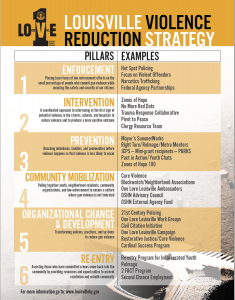
Chief Conrad said that since Nov. 1, LMPD’s newly expanded Narcotics Division has made 244 felony arrests and 59 misdemeanor arrests; and executed 169 searches, uncovering 57 pounds of heroin, 40 pounds of cocaine 73 points of meth and 125 guns.
And the additional funding allocated in December so far has covered 13,709 hours of overtime that allowed for increased patrols in the neighborhoods where violent crime has been most pressing — Park Hill, Russell, Shawnee, Shelby Park, Smoketown and Victory Park.
The Chief said he recently revised the increased patrols to be more strategic about when officers are deployed. “We want to be smart about spending these tax dollars, and mindful not to lean so heavily on overtime that we wear out our officers, who are extremely dedicated to this battle,” the Chief said.
Louisville Metro Police has hired 14 additional officers who are in training now and plans to hire 14 more this summer.
Office for Safe and Healthy Neighborhoods: Creating new pathways
Abdur-Rahman and Gentry said OSHN also is using expanded resources to focus on locations where there are more violent crimes involving youth, and efforts to create pathways away from violence through training, support and educational assistance.
They stressed that OSHN’s charge is long-term, focused on identifying and alleviating many of the root causes of violence, including economic and educational challenges as well as historic, systemic barriers to success for people in the neighborhoods most plagued by violent crime.
But they also pointed to indicators of success, including 100 people who found jobs through Zones of Hope, and 158 young people involved in ReImage, which helps stop the cycle of crime and violence by intervening with youth who’ve been charged with a crime or are at high risk of criminal behavior. Of those 158, 78 have gotten jobs, three have gotten a GED, and 17 have either completed a degree or started college.
OSHN represents a holistic approach in coordinating the efforts of many city agencies and partner organizations, ranging from Metro Parks and Recreation to the Louisville Urban League, Peace Education and Neighborhood House. Through those partnerships, OSHN is engaged with such programs as Zones of Hope, No More Red Dots, Pivot to Peace and, most recently Cure Violence, a cutting-edge method to reduce neighborhood violence by using the same health strategies used to fight infectious diseases. Cure Violence experts from Chicago were in Louisville last week for an assessment visit and training.
Funding for Cure Violence ($83,000) was part of a $625,000 allocation set aside for violence reduction efforts in the budget adjustment. Gentry and Abdur-Rahman outlined spending plans for the rest, including $120,000 to boost OSHN staffing from four full-time staffers to seven, as well as funding for Urban League and Peace Education programs, and 143,000 to external partner agencies for other, smaller programs focused on reducing violence.
“Just as there is no one reason for violence, there is no one solution for alleviating it,” Abdur-Rahman said. “Together, we’re investing in our youth, supporting young people who are trying to change their lives. That, in turn, helps all of us build a safe, more vibrant community.”
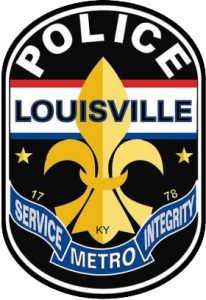
Credit: Louisville Metro Police
It is no secret that last year Louisville saw a record number of homicides. It seemed as though a new shooting or a new homicide was being reported every day, sometimes multiple times in one day. According to LMPD, Louisville, saw an increase of just under 50% to 117 homicides (123 for the entire county) during 2016, the highest since 1976 (104 total homicides). The majority of victims were black, accounting for a little more than 60% of the total. The majority of the victims were also male, approximately 79%, and more than half of the victims were between the ages of 18 and 34. LMPD was able to make 58 arrests in the homicide cases and the average suspect is the same as the average victim: a black male between the ages of 18 and 34.
Louisville also saw an increase in the number of shooting incidents, 504 compared to 353 last year. 504 shooting incidents is also the highest that has been recorded in the past five years. Of those 504 shootings, 102 were fatal.
Since gun control has been a hot topic the past year due to the election and a small group of Kentucky Mayors asking for the State Legislature to change state law regarding gun control, many of the other violent crime categories seemed to have been ignored by the local news. Here are some of the crime statistics and how they compare to last year:
- Robbery – 1,873, roughly the same as last year;
- Aggravated Assault – 2,921, up from 2,558;
- Rape – 149, down from 163;
- Property Crime – 29,890, up slightly from 28,055;
- Burglary – 5,884, down slightly from 6,229;
- Larceny – 19,808, up slightly from 18,751;
- Motor Vehicle Theft – 4,198, up from 3,075
According to Mayor Fischer, violent crime is “tragically acute in a few specific neighborhoods.” Looking at the maps by LMPD division, all eight divisions have been affected by homicide and shooting incidents. However, it appears that the majority of the homicides, shooting, and aggravated assaults occurred in the 1st (mainly north of Broadway and between I-264 on the east and west) and 2nd divisions (mainly west end). Taken in total, Louisville saw an overall increase by 9% in all violent crimes and a 46% increase in homicides. This appears to be outpacing the national average. Nationwide data is still pending, but as of June 2016, the country saw an overall increase in violent crime by 5% in general, and a 5% increase in the number of homicides when compared to the first six months of 2015. If the data is limited to only cities that are comparable in size to Louisville, there was a 5% increase in all violent crimes and only a 2% increase in homicides.
After averaging about ten homicides per month last year, Louisville has registered 15 homicides as of February 15, which is about the same as last year. While we are not seeing decrease in number of homicides as of now, hopefully, we will not see another record-breaking year.
Attorney General Andy Beshear joined the Truckers Against Trafficking (TAT), the Kentucky Baptist Convention, the Kentucky Hotel and Travel Industry, Free 2 Hope, the Kentucky Trucking Association, WDRB and Catholic Charities of Louisville to raise awareness about one of the nation’s fastest growing criminal enterprises – human trafficking.
The 11th of each January is National Human Trafficking Awareness Day. January is National Human Trafficking Awareness Month.
Over the last year, Beshear has established the Kentucky Attorney General’s office as the leading agency fighting human trafficking, a modern-day form of slavery in which adults and children are forced into sex or labor services.
“Human trafficking represents the worst form of abuse, often to children, and it is increasing in Kentucky,” Beshear said. “That’s why my office is partnering with the public and private sector to enhance and improve policy measures and training opportunities to increase resources and awareness to help end human trafficking.”
Beshear’s office receives direct complaint information on possible human trafficking from the Cabinet for Health and Family Services and the National Human Trafficking Hotline.
In just the last quarter of 2016, Beshear’s office provided assistance on 14 possible incidences of human trafficking and acted as the sole investigative agency on five cases.
For 2016 as a whole, the AG’s Department of Criminal Investigations provided technical assistance to local law enforcement agencies on 32 possible human trafficking cases, resulting in the identification of two minors who were being trafficked for sex.
The office was selected by the United States Department of Justice as the first Kentucky government agency to receive a federal human trafficking grant, and has forged partnerships with the trucking and hospitality industries, and the Baptist Convention.
“As the largest denomination in the Commonwealth, the Kentucky Baptist Convention feels a special burden to stand with the attorney general to prevent human trafficking and rescue those individuals whose lives are systematically and cruelly devastated,” said Hershael W. York, chairman of the Kentucky Baptist Convention Public Affairs Committee and pastor at Buck Run Baptist Church of Frankfort. “The resulting devaluation of human life and the loss of human dignity is an attack on all of us. Victims of human trafficking are surely emblematic of Jesus’ concern for ‘the least of these’ and so we must accept the mandate of protection, deliverance and justice.”
“Professional drivers have proven time and again that they are the eyes and ears of our nation’s roadways,” said Truckers Against Trafficking Executive Director Kendis Paris. “They are in places and see things that most of us do not. If we can train every CDL holder in America to recognize and report human trafficking as they’re seeing it, many more victims will be recovered out of a life of forced prostitution. Truckers Against Trafficking is extremely grateful to be partnering with the Kentucky Attorney General’s office and the Kentucky Trucking Association to reach this critical goal, and we applaud both groups for being leaders on this issue.”
“The Kentucky Trucking Association, our members and the trucking community in this state and around the country pledge our support to Truckers Against Trafficking and its mission,” Guy Young, president and CEO of the Kentucky Trucking Association. “Our thanks to Attorney General Beshear for his leadership on this important issue. We are hopeful that the public-private partnerships formed in Kentucky to fight human trafficking will continue to make a difference in this human tragedy. Awareness and training for our professional drivers has led to increased reporting of suspected activity, rescue of many victims, and the arrest and prosecution of those responsible. We are glad to extend our help to TAT in any way we can.”
“Kentucky’s tourism industry is fully prepared to help inform and educate our businesses and employees about human trafficking,” said Hank Phillips, president and CEO of the Kentucky Travel Industry Association. “This activity is so despicable, that there can be a temptation to ignore it and pretend it does not exist. We cannot do that and we will not do that.”
“Human trafficking is a crime that is hidden in the seams of Kentucky communities, in rural and urban areas,” said Marissa Castellanos, human trafficking program director for Catholic Charities of Louisville. “Workers are being abused and enslaved in horrific conditions on farms, in restaurants, in domestic work, and other Kentucky businesses. Men, women, and children are being exploited for commercial sex, forced to engage in sex acts, resulting in thousands of dollars in profits for traffickers. Survivors need supportive services in order to regain control of their lives and begin healing. Catholic Charities is committed to helping victims of human trafficking with case management services, basic needs, immigration relief, advocacy, and other services. We hope Kentuckians will continue to raise their awareness of this issue, and look for ways to engage as more conscious consumers and by reporting potential trafficking activities to law enforcement.”
Human trafficking victims are often the most marginalized in society – victims of abuse and violence, runaways, refugees and immigrants, Beshear said.
“They are coerced into submission by their abusers through many immoral means, including forced dependence on drugs, violence, threats and manipulation,” Beshear said. “And the problem is getting worse.”
Human trafficking reports to the Cabinet for Health and Family Services have grown by 50 percent each year, climbing from 51 victims in 2013 to 169 reported cases for 2015.
Beshear said his office is working with state and federal partners to fill these gaps in several different ways.
“We are getting real time case information from state and federal agencies, and reaching out to local law enforcement, prosecutors and social workers,” he said. “We’re offering support for investigations, victims services referrals, legal research, specialized training and prosecution assistance.”
Beshear recognized WDRB Television in Louisville for producing the human trafficking awareness video that will be shown to train the employees of each participating hotel, convention center and others from the tourism industry.
The Kentucky Human Trafficking Task Force will meet on Wednesday to discuss plans to use the federal grant to hire a specially trained human trafficking investigator, enhance the collaborative efforts of the task force to ensure victim-centered response, investigation, prosecution and follow up services in cases of human trafficking. The grant will also allow the task force and AG’s office to better collect data on human trafficking.
To learn more about human trafficking and efforts to fight it, visit Catholic Charities of Louisville Rescue and Restore program website at http://www.rescueandrestoreky.org, or contact the Attorney General’s Office of Child Abuse and Exploitation Prevention at 502-696-5300.The national hotline is 888-373-7888.
Attorney General Andy Beshear and his Cyber Crimes Unit today announced a Jefferson County man has pleaded guilty to one count of unlawful transaction with a minor, a Class D felony.
Gregory Keith Brown, 59, of Louisville, agreed to a two-year sentence as part of his plea agreement entered this week in Jefferson Circuit Court.
Brown was arrested in 2015 by AG cyber investigators along with assistance from the Kentucky State Police.
According to cyber investigators, Brown sent electronic messages to an undercover officer posing as a 15-year-old girl for the purposes of engaging in illegal sexual acts. A search warrant executed at a residence in Louisville revealed Brown was actively seeking a sexual partner, preferably a minor.
Brown was charged with prohibited use of an electronic communication system to procure a minor in a sex offense.
The work of the Cyber Crimes Unit, a division of the Department of Criminal Investigations in the Office of the Attorney General, is part of Beshear’s core mission to keep sexual predators away from Kentucky’s families and children. Since Jan. 4, Beshear’s office has arrested or convicted 44 sexual predators.
“The Attorney General is the chief advocate and protector for our Kentucky families, and it’s our job to partner with law enforcement at every level to take those who would exploit children off the streets to ensure our communities are safe,” Beshear said. “I want to thank Mike O’Connell and his office along with the Kentucky State Police for working Attorney General Andy Beshear and his Cyber Crimes Unit today announced a Jefferson County man has pleaded guilty to one count of unlawful transaction with a minor, a Class D felony.
Gregory Keith Brown, 59, of Louisville, agreed to a two-year sentence as part of his plea agreement entered this week in Jefferson Circuit Court.
Brown was arrested in 2015 by AG cyber investigators along with assistance from the Kentucky State Police.
According to cyber investigators, Brown sent electronic messages to an undercover officer posing as a 15-year-old girl for the purposes of engaging in illegal sexual acts. A search warrant executed at a residence in Louisville revealed Brown was actively seeking a sexual partner, preferably a minor.
Brown was charged with prohibited use of an electronic communication system to procure a minor in a sex offense.
The work of the Cyber Crimes Unit, a division of the Department of Criminal Investigations in the Office of the Attorney General, is part of Beshear’s core mission to keep sexual predators away from Kentucky’s families and children. Since Jan. 4, Beshear’s office has arrested or convicted 44 sexual predators.
“The Attorney General is the chief advocate and protector for our Kentucky families, and it’s our job to partner with law enforcement at every level to take those who would exploit children off the streets to ensure our communities are safe,” Beshear said. “I want to thank Mike O’Connell and his office along with the Kentucky State Police for working with our investigators on this case.”
Brown will be ineligible for probation and will be under supervision five years after being released from prison. He is required to complete a sex offender treatment program and must register as a sex offender.
with our investigators on this case.”
Brown will be ineligible for probation and will be under supervision five years after being released from prison. He is required to complete a sex offender treatment program and must register as a sex offender.
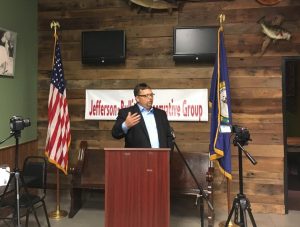 This week, three local candidates running for office held a town hall forum where they took questions from the voters. Michael Payne, Harold Bratcher, and Shane Ranschaert each had a turn at the microphone where they were able to talk not only about policies, but also about why they became involved in politics. All three candidates are running for office for the first time, and all three are unhappy with the state of politics in the Louisville area and felt that the best way to help the community is to become involved. With the election fast approaching and the Presidential race garnering so much attention, it can be easy to lose track of local races.
This week, three local candidates running for office held a town hall forum where they took questions from the voters. Michael Payne, Harold Bratcher, and Shane Ranschaert each had a turn at the microphone where they were able to talk not only about policies, but also about why they became involved in politics. All three candidates are running for office for the first time, and all three are unhappy with the state of politics in the Louisville area and felt that the best way to help the community is to become involved. With the election fast approaching and the Presidential race garnering so much attention, it can be easy to lose track of local races.
Harold Bratcher is running the US House of Representatives, District 3. District 3 in KY is all of Jefferson County, and therefore, all of Louisville. Representatives will go to Washington D.C. to represent all the citizens on Louisville in the United States Congress for a 2-year term. Bratcher graduated from Valley High School (class of 1991) and we worked for some trucking companies. He recently opened his own freight company and has been operating out of Louisville since 2013. Bratcher is running against incumbent John Yarmuth, who is seeking re-election for his sixth term.
Bratcher focused on three major talking points: supporting small business, preserving the Constitution, and immigration. Being a small business owner himself, Bratcher knows a lot about what is needed to run a small business. NAFTA and TPP have been brief topics in the recent presidential debates, but Bratcher has believed for years that NAFTA has negatively impacted this country’s economy and believes that the TPP will be just as bad, if not worse. “NAFTA cost a minimum of 1 million union, and non-union high paying manufacturing jobs,” he said, adding that this equals about 25% of the manufacturing capacity that was here previously. With the unemployment rate being as high as it is, he believes the answer is to invest in small business. “Giving $100 million to 100 small businesses will create more jobs than giving that money to one big corporation,” he said. He also proposes cutting taxes across the board, which he believes will create more jobs and by putting more money in consumer pockets, will result in more revenue in taxes.
Bratcher identified himself as a “Constitutional Conservative” and believes that government needs to be smaller and less involved in our everyday lives. He applies this to every Constitutional right, including the first and second amendments. He admitted that he is a new firearm enthusiast, but recognizes that the laws being proposed are already in place in some of the highest gun crime cities in the nation. “If the laws don’t work in Chicago, why would they work here,” he asked. He also believes that individual, civilian gun-ownership keeps America is safer as nation. Bratcher went on to talk about balancing the budget: “Everyone is concerned about the D and the R. This is why we have no balanced budget and this is why there is gridlock. I’m willing to work towards the middle, but it needs to be a give and take.”
Being the only candidate running for a federal office, Bratcher was the only one to talk about immigration. Bratcher understands that this is a country of immigrants and accepts immigrants who come to the United States legally. His first concern, however, is that we have millions of homeless Americans here and we should address that problem before trying to take on the task of helping other countries.
Michael Payne is running for State Representative, District 28. District 28 starts in the southern part of Pleasure Ridge Park and continues south along Dixie Highway to West Point, KY. State Representatives go to Frankfort, KY where, like the federal House of Representatives, they serve a 2 year-term where they represent a portion of Kentucky residents for state legislation. Payne is a graduate of Valley High School (class of 1990) and went on to study at both Sullivan University and University of Louisville. He has worked as an engineering specialist for UPS, an engineering manager for a local material handling firm, and currently works at Sullivan College as an instructor. Payne is running against incumbent Charles Miller, who is currently seeking re-election for his tenth term.
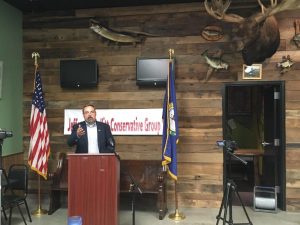 Payne focused on several major talking points: the economic depression, the education system, and crime. Payne believes that best way to address the economic issues is to attract new businesses into the state and Kentucky is having a hard time competing with the surrounding states. He stated that the best way to encourage investments into the state and to encourage entrepreneurs is to reform the tax code with a flat tax and improve the work force through training programs that promote hands on, technical skills.
Payne focused on several major talking points: the economic depression, the education system, and crime. Payne believes that best way to address the economic issues is to attract new businesses into the state and Kentucky is having a hard time competing with the surrounding states. He stated that the best way to encourage investments into the state and to encourage entrepreneurs is to reform the tax code with a flat tax and improve the work force through training programs that promote hands on, technical skills.
When it came to education, Payne said, “Don’t throw more money at the problems.” He feels that teachers are being prevented from doing the jobs because of curriculum standards as well as social standards. He believes teachers know best on how to teach their students and that the state needs to take a step back and allow them to teach. Further, Payne says that he would like to see subject matter experts within a field to be allowed to teach without the need for certifications. He feels that this would enable students to learn more and encourage critical thinking. As for higher education, Payne said tuition rates need to be frozen and universities need to start acting like the businesses that they are, not charities. Payne also believes that public universities should be opened up to accommodate concealed carry weapons for license holders on campus while private universities should be left to decide on this issue for themselves.
The heroin epidemic and the rising crime rate has effected everyone in the community. Payne believes that law enforcement needs to be given more ability to do what is needed, and that the judicial system needs to be able to sentence certain offenders more. While believing that dealers and other distributors need to be held accountable, he believes that there needs to be a “compassionate hand to the addicts”. Once in jail, rehabilitation programs need to start and programs need to be in place that allow the addicts access to affordable treatment when they leave jail.
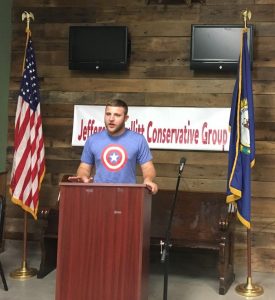 Shane Ranschaert is running for Metro Council, District 14. District 14 is in the far southwest portion of the county, including most of Valley Station west of Dixie Highway between Greenwood Rd and the Gene Snyder, south to include Valley Village, areas surrounding Jefferson Forest to the county line. Councilmembers stay in Louisville where they represent their district for a four-year term. Ranschaert is running against incumbent Cindi Fowler, who is seeking re-election for her second term.
Shane Ranschaert is running for Metro Council, District 14. District 14 is in the far southwest portion of the county, including most of Valley Station west of Dixie Highway between Greenwood Rd and the Gene Snyder, south to include Valley Village, areas surrounding Jefferson Forest to the county line. Councilmembers stay in Louisville where they represent their district for a four-year term. Ranschaert is running against incumbent Cindi Fowler, who is seeking re-election for her second term.
Ranschaert also had three talking points: adequate representation for the southwest portion of the city, taxes and regulations, and the rise in crime and heroin use. Ranschaert said he is tired of seeing Southwest Louisville ignored until election time and he wants to make sure that the residents of District 14 feel like they matter all the time, not just when politicians are seeking votes. Ranschaert explained that he would like to see taxes in the city cut, stating that Louisville is the third most taxed city in the US and one of the most regulated cities in the US. He wants to cut taxes and address infrastructure issues, such as the malfunctioning flood pumps along the Ohio River. He cited a similar plan to Payne’s for addressing the rise in heroin use and crime and wants police to be able to more effectively perform their duties, and wants to see task forces developed to utilize all local agencies to make Louisville as uncomfortable as possible for drug dealers. He also wants to see addicts being helped and treated and not just pushed through the system.
If you did not have the chance to attend the town hall, all the candidates have contact information on their websites and all three candidates have Facebook pages and welcome your questions. As with any election, it is important to be informed and voters should take the time to research the candidates before making a decision. A sample ballot for your location can be found on the Jefferson County Clerk’s website. The deadline to register to vote in this election cycle was October 11. If you are not registered to vote, you can still register, but you will be eligible to vote in the next May primary.
Device found in motor fuel pump at Richmond retail establishment

Kentucky Department of Agriculture inspectors found this skimmer inside a fuel pump in a Richmond retail establishment.
Kentucky Department of Agriculture inspectors discovered a credit card “skimmer” during a routine inspection of a motor fuel pump at a Richmond retail establishment earlier this month.
“This device was discovered by our inspectors as part of their everyday job duties,” Agriculture Commissioner Ryan Quarles said. “We took on this responsibility at no additional cost to Kentucky taxpayers. This discovery saved consumers thousands of dollars in fraudulent charges that could have been made with data stolen by the use of this device.”
The skimmer – an electronic device used to capture data from consumers’ credit cards – was removed and turned over to Richmond police.
Losses due to credit card skimming are expected to exceed $3 billion globally this year, according to consumer transaction technology company NCR of Duluth, Ga.
The KDA is charged with the task of inspecting motor fuel pumps in every retail establishment in the Commonwealth once a year to ensure that the amount of fuel dispensed matches the amount shown on the pump, and checking to make sure pumps are in proper working order. As part of the inspection, they look for signs that a pump has been compromised by thieves who install skimmers to steal consumer data. The data is used to produce fake credit cards and make fraudulent charges on the victim’s account. Inspectors shut down any pump that may have been tampered with and report the incident to law enforcement authorities.
Jason Glass, assistant director of the KDA’s Division of Regulation and Inspection, said card readers on fuel pumps are especially susceptible to tampering because pumps often are located out of sight of an attendant.
Glass said retailers are taking action to prevent credit card skimming by installing proprietary locks on pumps, using security tape to seal the pumps, and logging the numbers on the tape to make sure the seal hasn’t been broken and replaced. Some pumps shut down when they are entered unlawfully, Glass said. Credit card companies are deploying technology to make credit cards harder to skim, he said.
Glass said consumers can help themselves by looking for signs that a pump has been tampered with, such as locks that appear to have been compromised, doors that may have been pried open, and security tape that is broken or doesn’t adhere to the pump.
Consumers may report suspected tampering to the retailer, law enforcement, or the Kentucky Department of Agriculture. To submit a report to the KDA, call (502) 573-0282 or email ag.web@ky.gov. Please include the retailer’s name and location, the pump number, and the fuel grade.
Dr. Mark Jorrisch, a long-time practitioner in the field of addiction medicine, recently gave a presentation on the basics of opioid addiction. Dr. Jorrisch is the medical director for the Louisville Metro Methadone Opiate Rehabilitation Center (MORE) and the BHG Clinic in Lexington, KY.
 Weather
Weather Traffic
Traffic @LouisvilleDispatch
@LouisvilleDispatch @LouisvilleDisp
@LouisvilleDisp Subscribe
Subscribe